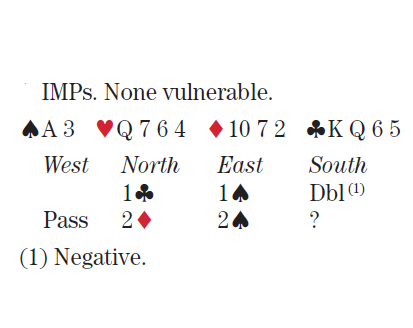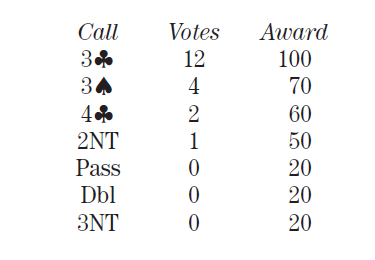
What’s your call?
| 2NT | ||||
| 3♣ | 3♦ | 3♥ | 3♠ | 3NT |
| 4♣ | 4♦ | 4♥ | 4♠ | 4NT |
| 5♣ | 5♦ | 5♥ | 5♠ | 5NT |
| 6♣ | 6♦ | 6♥ | 6♠ | 6NT |
| 7♣ | 7♦ | 7♥ | 7♠ | 7NT |
| Dbl | Pass |
The gist of this problem seems to be ascertaining whether partner’s 2♦ bid is a true reverse. All but one of the 3♣ bidders say no, or express some uncertainty.
Falk explains: “No, 2♦ was not a reverse and did not show extra values — that’s how partner bids with 4–5 in the minors or even 4–4 with better clubs. Missing a non-vulnerable game is the same as bidding game and going down when it’s our hand for a partscore.”
Robinson, too, thinks the hand is a partscore. “1♣–2♦ is not a reverse. It just shows a minimum hand with four diamonds and five or more clubs.”
Robinson suggests that partner, holding:
♠8 7 2 ♥5 3 2 ♦A K Q ♣A 9 7 4
could well respond 2♦ to the negative double.
Lawrence bids “a wimpy 3♣” on the theory that if partner has a good hand, he will bid again. “It may be that we cannot make 3NT even facing a good hand.”
Rigal believes that partner’s 2♦ denies reversing values. “With that hand, he’d jump to 3♦ or cuebid,” he says. “I always open my better minor and do not open 1♦ with 4–5 and a minimum hand if I can possibly avoid it, so I expect to be facing 4–4 or 4–5 in the minors and 12–15 high-card points. 3♣ is still not an overbid.”
Meyers opens 1♣ “most of the time” with 4–4 in the minors, “I don’t play that 2♦ shows extras.”
The Gordons ask, “3♣ — overbid or underbid? We can take the bull by the horns with 3♠ or even some number of notrump. We can pass the buck with a second double. Here we think our lack of intermediates and balanced shape are enough to convince us. This does raise an interesting question: If you and your partner open 1♣ with 4–4, what do you do over 1♣–(1♠)–Dbl–(Pass) holding something like:
♠7 3 ♥K 8 3 ♦A 8 6 2 ♣A Q 5 4?
Personally, we would bid 1NT and prepare to apologize. We think 2♦, while not a reverse, shows some extra strength or shape.”
Kennedy is unsure whether 2♦ in response to a negative double constitutes a true reverse. “If it isn’t, 3♣ should be sufficient.”
Of the 3♣ bidders, only Stack is certain that partner’s 2♦ is a true reverse. “3♣ should be forcing. This is an excellent hand after a reverse and we plan to cuebid 3♠ after partner bids 3♦ or 3♥, and will pass 3NT if partner bids that.”
For the most part, the non–3♣ bidders treat 2♦ as showing extras.
It is the Sutherlins’ theory that partner’s 2♦ shows reverse values. “If so, slam is certainly possible. 3♠ feels like the best bid to move forward.”
Walker says that because the negative double didn’t promise diamonds, “partner’s 2♦ should show reversing values. Even if you disagree with that premise, this hand is too strong for a competitive 3♣, which you might bid with a 7-count.”
Boehm calls his 3♠ response a “typical utility cuebid — a good hand lacking clear direction.”
Meckstroth and Weinstein leap to 4♣.
Weinstein says, “I assume 2♦ shows at least a solid hand (I wouldn’t think it is a reverse), so I am going to show my excellent club support and a pretty good hand.”
Meckstroth doesn’t mind skipping over 3NT to propose the minor-suit game. “I don’t think 3NT will make with only one spade stopper.”


